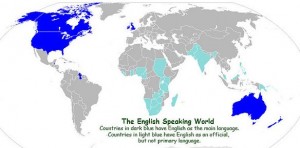The Future of English December 29, 2011
Author: Beach Combing | in : Actualite , trackbackThere have been various ‘world’ languages, beginning with Greek, moving on to Latin, and from there changing rapidly from Portuguese, to Spanish, to French and more recently to English. Beachcombing spent a lazy moment yesterday browsing a nineteenth-century essay on the ‘inevitable’ triumph of English, the author arguing that not only would English become the world language, but that it would be permanently enthroned in that role, never mind, any geopolitical changes. How likely is this though and have the writer’s words – made in the balmy days of British imperium – been borne out in the century and a half since it was written? Will, what began life as the dialect of hicks around Birmingham really become and remain the global tongue?
The triumph of English in 1800-2000 was based on three factors. First, there was the coincidence that two successive world powers, imperial Britain and the ‘imperial’ US, spoke the same language, something without precedence in Western history. Second, English had drifted away from its Indo-European roots shedding (thank God!) declensions, verb stems and cases becoming a remarkably easy language: particularly if you don’t mind non-native speakers going ‘Estuary’ and speaking with seven rather than the requisite fourteen vowels. (The great misfortune of English is its obscene spelling system, that could so easily have been made phonetic in the eighteenth or early nineteenth century: a missed opportunity). Then, third, English has had the fortune to have been the world language at the moment of globalisation. English not Arabic is the language of Google and Twitter.
Will English survive as the top language given the geo-political changes that are likely to shake the world in the next years? Beachcombing, of course, has not the slightest idea and more sensible notions should be sent to drbeachcombing AT yahoo DOT com However, two almost random thoughts.
English very likely is crystallizing into a world tongue: as a native speaker Beach has noted with some alarm the way that ‘his’ language’s rules are being changed not through the grind of tongues in the Thames valley basin or on Manhattan Island but by the mistakes in foreign-learners’ classrooms. (What is the plural of deer, for example?) English is crystallizing though at a time when technology is also advancing rapidly. Indeed, Google Translate and Babel Fish are now able to give a tolerably close translation of most major world languages: they still have a way to go with Ancient Greek and Gaelic but, anyway… It may, in fact, be technology that means we don’t really need an international koine. What are the bets that in twenty years entrepreneurs from Kenya will arrive in Paris with a nifty simultaneous translating machine – such as those already used by the American army in Iraq and Afghanistan – and that the business meeting will advance in French and Swahili without any reference to l’anglais?
Second, if quantitative easing really does push the west down into the second league, economically speaking, in the next ten years, it will be ‘interesting’ to see whether the shift in power towards China and India takes place in a bloodless or a bloody way. If the former it is possible to imagine a world where India, and western Europe and the Americas come to an understanding against Chinese hegemony. If so then the succession of Britain, the US and India will provide three English-speaking world powers in succession. It is difficult to imagine humanity ever getting over that. A bloody shift of power though with economic and military might shifting to China after an exchange of nuclear weapons over Taiwan, say, might easily lead to Mandarin graffiti in London and New York by 2100.
Beachcombing wants to take this opportunity to wish a belated happy Christmas to his friends the Chinese hackers.
***
KMH writes in ‘My idea for English is that it will eventually assume the same status Latin had for written material, especially for religion, science, technology and academia. For speaking it will further fragment into more dialects although it may never mutate into the equivalent of the romance languages. Each dialect may incorporate elements of a native language with English, the most widely known second language. The long-term cultural future belongs to the Asiatic peoples and their languages, especially Mandarin. The ideographs would be good to leave behind since they aren’t as precisely interpretable as true words using an alphabet. Ultimately we will need a new language for the new kinds of situations and humans of the far distant future when we have exhausted the current ones. Zephaniah 3.9 actually predicts such a new language. Anyone interested in Esperanto?’ Adrian S meanwhile is taking an even longer view with futurese: From ‘Wé cildra biddaþ þé, éalá láréow, þæt þú tǽce ús sprecan rihte, forþám ungelǽrede wé sindon, and gewæmmodlíce we sprecaþ…’ to ‘We children beg you, teacher, that you should teach us to speak correctly, because we are ignorant and we speak corruptly…’ to ‘Wi txìldran beg yu, titxar, dat yu xùd titx as tu spik karektli, bikaz wi ar ìgnarant and wi spik karàptli…’ and finally ‘*ZA kiad w’-exùn ya tijuh, da ya-gAr’-eduketan zA da wa-tAgan lidla, kaz ‘ban iagnaran an wa-tAg kurrap…’ Or for a more lighthearted view (also via Adrian). Southern Man writes in ‘Your readers (and you) should go and look what Burgess did in the Clockwork Orange.’ Thanks KMH, Adrian and Southern Man



